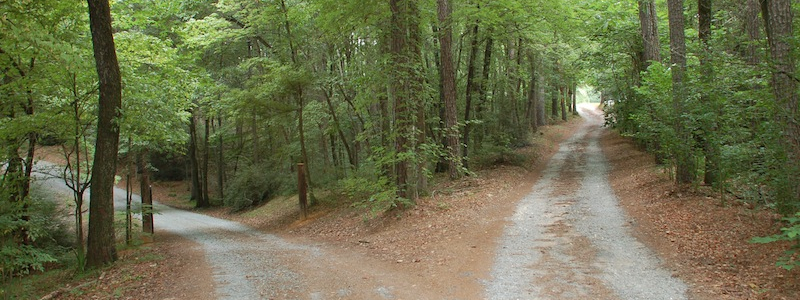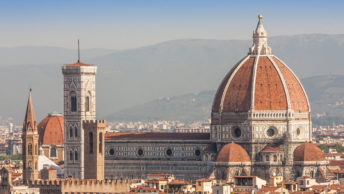
Once upon a time a traveler was walking home after spending many years in a distant country…
At sunset he entered a vast forest, a forbidding but unavoidable obstacle on his journey. Just as he realized he would quickly become lost, he saw an elderly shepherd, and asked for directions. The shepherd responded, “Alas! It is not easy to point out the way, for the forest is crisscrossed by hundreds of trails winding in every direction, and all of them except one lead to the Great Abyss which surrounds the forest. Moreover, the forest is filled with robbers and wild beasts, including an enormous serpent, all of whom frequently kill unfortunate travelers. However, don’t despair—I and my sons have dedicated ourselves to guiding travelers safely to their destination. We will help you, if you’ll trust us enough to follow us.” The elderly shepherd seemed trustworthy, so the traveler agreed; the shepherd held a lantern aloft with one arm, and led the traveler by the other. When the traveler became weary during the long journey, the shepherd told him to lean upon him for strength, and this allowed him to continue. In the middle of the night they came to a cabin inhabited by one of the shepherd’s sons, who provided the traveler with nourishing food, and then took over from his father. The same thing happened twice more as they continued through the forest; the traveler was led to a place of rest each time, and another of the shepherd’s sons continued guiding him safely on his journey.
At sunrise, they came to the edge of the forest, and the traveler saw they were alongside a deadly cliff, which dropped into a deep canyon whose bottom was too far down to see. The shepherd’s son announced, “This is the Great Abyss my father spoke of,” and then sighed from the depths of his heart. “What’s wrong?” the traveler asked, and his guide explained, “Every time I see this abyss, I think of the numerous travelers who end up falling into it. My father and brothers and I offer our services, but usually in vain. Most people claim they don’t need us, or accuse us of wanting to control them or limit their freedom, and go off by themselves; they soon lose their way, and are devoured by the serpent, murdered by robbers, or fall into the depths below. See that small bridge over there? That’s the one safe way across the Great Abyss, and my family and I are the only ones who know of it—and now, because you followed our guidance, you can cross in safety, and on the other side you’ll find your true home.” The traveler thanked his guide profusely, crossed the bridge, and soon reached home, where his family welcomed him with great joy (Brian Cavanagh, Fresh Packet of Sower’s Seeds, pp. 47-49).
This story by an anonymous author is obviously an allegory, a symbolic tale in which each element stands for something. The forest represents life, which is filled with potential confusion and danger—particularly the serpent, or the devil, who seeks to destroy us; the Great Abyss, of course, stands for hell. The shepherd and his sons symbolize the Church, which can help people find the single narrow path that safely leads to eternal life and our true home of Heaven. The stakes on this lifelong spiritual journey are much higher than most people realize or admit. Jesus doesn’t want anyone to be lost, but we must have the humility to follow and obey those He has appointed to guide us.
A very common assumption these days is that virtually everyone will be saved—but that’s not what Jesus implies in the Gospel. When asked “Lord, will only a few people be saved?,” He doesn’t give a direct answer intended to satisfy someone’s intellectual curiosity. Instead, Our Lord responds with an urgent and unmistakable warning: “Strive to enter through the narrow gate, for many . . . will attempt to enter but will not be strong enough.” He also uses the image of a deadline in which the door to eternal life is locked once and for all, with people shocked to discover themselves irretrievably locked outside; the very strong implication is that none of us can afford to take our salvation for granted. “Rubbing shoulders” with Jesus, or merely observing the outward signs of religion, won’t be enough; a true commitment is required. The good news, however, is that everyone who does make such a commitment will be welcome in Heaven, regardless of nationality, race, or social status; as Isaiah foretells, people of every land and language will be invited to share in God’s glory. The Letter to the Hebrews reminds us that God treats us as His children—which means He will discipline us when necessary; if we forget or ignore His commandments and the leadership of the shepherds He has appointed, He’ll allow us to experience the bad results of our stubbornness in the hope we’ll come to our senses and turn back to Him.
It’s true that in “the old days,” there was too much emphasis on hell and too many “fire and brimstone” sermons—but now the opposite seems to be the case; the reality of hell is rarely mentioned. There are several points to consider, however. The first is that in the Gospels, Jesus actually talks about hell or eternal damnation more than He mentions or describes Heaven. Secondly, if we acknowledge Jesus as our Savior, that leads to a simple but vital question: what is He saving us from? Obviously from something terrible and disastrous—what we call hell. To the objection that since Jesus saved us, we have nothing to worry about, a third point must be considered: if salvation is automatic, why did Jesus give His Church such great spiritual power and authority over sin, particularly through the Sacraments of Baptism, the Eucharist, and Reconciliation? Obviously damnation remains a real possibility, even after Christ’s saving death and Resurrection. Our Lord certainly doesn’t want us to become fearful or obsessed with hell, but He does want us to be aware of the spiritual dangers surrounding us—precisely because if we stay on our guard, then we can safely proceed through life in a spirit of joy and gratitude.
As the traveler in the story discovered, the way to do this is by following the guidance of the shepherds whose task it is to point out the path that leads us safely home. In the same way, Jesus wants us to be faithful, active, committed members of His Church, humbly accepting the spiritual teaching and guidance of the Holy Father and those religious leaders in union with him, instead of stubbornly insisting on going our own way. Life in Heaven is wonderful, but it isn’t automatic or guaranteed; we must do our best to live in a way that shows our genuine and grateful acceptance of this great gift.








